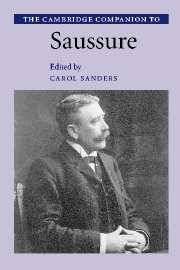Book contents
2 - The Paris years
from Part I - Out of the nineteenth century
Published online by Cambridge University Press: 28 May 2006
Summary
Saussure did not arrive in Paris from Leipzig and Berlin with the ideas that generated the Cours de linguistique générale, and he did not leave Paris without them.
(Aarsleff, 1982: 393)Underlying this chapter is the assumption that, in charting the history of ideas, it is important to situate them broadly in their contemporary intellectual context. In contrast to many commentators who sought the origin of some of the ideas contained in the Cours in the work of early German linguists, the intellectual historian Hans Aarsleff has insisted on the role of the 'Paris milieu' in shaping Saussure's ideas. This is not to deny the influence of the German comparative tradition, particularly on his dissertation or mémoire. While history and comparative linguistics remained an abiding interest for Saussure, it is nonetheless the theory of a systematic, synchronic linguistics as it appears in the Cours de linguistique générale which marks the beginning of European linguistics and which helped to launch structuralism in a wider arena. It is possible to argue that the young Saussure was already going beyond his German masters, with the ideas of language as a system, and of the phoneme as a concept if not a term, being embryonically present in the mémoire. Nevertheless, the ideas that would be published in the Cours were already shaped and articulated in his Paris lectures, according to Meillet. In order to understand developments in the study of language at the end of the nineteenth century, and the evolution of Saussure's own ideas and their subsequent impact, we shall look first at the discipline of linguistics as he found it on his arrival in Paris in the Autumn of 1880, and then at other disciplines, in line with Aarsleff's claim that 'The innovation begun by Bréal during the 1860s formed part of a broad movement in French intellectual life during the latter half of the nineteenth century' (1982: 310).
- Type
- Chapter
- Information
- The Cambridge Companion to Saussure , pp. 30 - 44Publisher: Cambridge University PressPrint publication year: 2004
- 2
- Cited by



